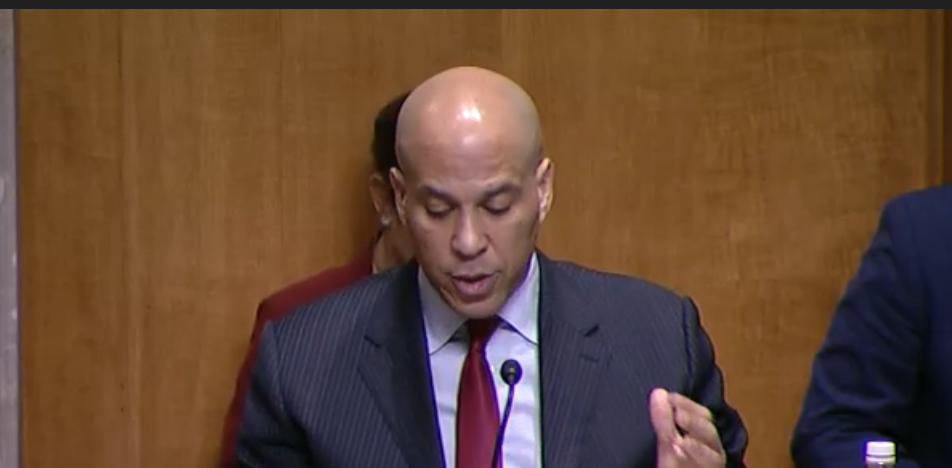Booker Introduces Bill to Expand Access to Health Care for Immigrants

WASHINGTON, D.C. – U.S. Senator Cory Booker (D-NJ) today introduced bold legislation to expand access to comprehensive health coverage for immigrants by reducing unfair and unjust barriers that currently exist.
The HEAL (Health Equity and Access under the Law) for Immigrant Women and Families Act has three main pillars. First, it expands access to Medicaid and the Children’s Health Insurance Program (CHIP) to anyone that is federally authorized to be in the United States, including DACA recipients, and removes the five-year waiting period that currently exists for lawful permanent residents to access Medicaid and CHIP.
Second, it enables undocumented immigrants to purchase health insurance plans from the online health insurance marketplace and benefit from health care subsidies if eligible. Currently, undocumented immigrants are banned from buying insurance on the ACA marketplace even if they would like to purchase a plan at full cost.
Third, it restores Medicaid eligibility for COFA migrants— individuals from the Federated States of Micronesia, the Republic of the Marshall Islands, and the Republic of Palau whose Medicaid eligibility was unjustly stripped by a 1996 law.
Insured rates are considerably lower among noncitizens, including both documented and undocumented immigrants. Barriers to health coverage disproportionately harm immigrant women, who are the majority of immigrants and particularly likely to have low incomes and be young and uninsured. According to the Guttmacher Institute, nearly half of noncitizen immigrant women of reproductive age who would otherwise qualify for Medicaid are uninsured.
While the bill has been introduced in the House, this marks the first time it has been introduced in the Senate.
Full text of the bill is available here.
“COVID-19 has shined a punishing light on the unjust health care inequities that exist for communities of color broadly, and immigrant communities in particular,” Booker said. “While we should always be working to expand access to health care for everyone, the dire current situation highlights the urgency of addressing these gaps in health care coverage. Health care is a right, and it shouldn’t depend on immigration status. We’re never going to be able to slow and stop the spread of the virus be if we continue to deny entire communities access to testing, treatment, or care.”
“If it isn’t affordable, then health care just isn’t accessible. For years, policy decisions about our health have forced immigrant women to fend for ourselves,” Sung Yeon Choimorrow, executive director of the National Asian Pacific American Women’s Forum, said. “Now, more than ever, it’s clear that every person should be able to get health care no matter how long they have been in the U.S. or the status they have been granted. Asian American and Pacific Islander women have been leading the charge for this groundbreaking legislation because our lived experiences show that access to the health care that is central to our agency and our lives, our families, and our communities.”
“Everyone needs access to the full range of reproductive health care to live with dignity and thrive. The current pandemic has placed a spotlight on the inequities in healthcare access that many Latinas/xs, people of color, people with low incomes and im/migrants face,” Ann Marie Benitez, senior director of government relations at National Latina Institute for Reproductive Justice, said. “At the Latina Institute, we are proud to have been in the forefront among the leaders driving the push for the HEAL for Immigrant Women and Families Act, and we applaud Sen. Cory Booker for introducing this bold legislation that would extend healthcare coverage to all im/migrant families, regardless of their documentation status or how long they have been living in the U.S. Healthcare is a human right, and the HEAL for Immigrant Women and Families Act is a step forward in expanding healthcare coverage.”
“The current pandemic has emphasized that while Black immigrants continue to risk their lives at the frontlines of the crisis, many are unable to access lifesaving testing and treatment. The HEAL for Immigrant Women and Families Act moves us closer to rightfully seeing healthcare as a human right rather than a luxury,” Catherine Labiran, Gender Justice Program Coordinator at the Black Alliance for Just Immigration, said. “Not only does the five year waiting period for Medicaid result in the manifestation of preventable medical conditions, it also impacts the quality of care that people receive after that point. With a lack of medical history in the U.S., many experience misdiagnosis and have to advocate for themselves so that their concerns are heard and acted upon.”
“In these difficult times, it is abundantly clear that our personal health and well-being are interdependent with our neighbors’, coworkers’, and society at large,” Kamal Essaheb, deputy director of the National Immigration Law Center, said. “NILC is proud to support the HEAL Act, and hold it up as an example of the kind of policy solutions Congress should be passing right now. Protecting the health and well-being of immigrants will ensure the health and well-being of us all.”
In addition to the above supporting organizations, the HEAL for Immigrant Women and Families Act is endorsed by over 100 organizations, including: The American Academy of Pediatrics, American Public Health Association, The Association of Asian Pacific Community Health Organizations, Black Alliance for Just Immigration, CLASP, Center for Reproductive Rights, Daily Kos, Families USA, First Focus, Hispanic Federation, In Our Own Voice, Indivisible, MomsRising, NAACP, NARAL, National Domestic Workers Alliance, NEA, National Immigration Law Center, National Institute for Reproductive Health, National Partnership for Women & Families, Planned Parenthood, Prevention Institution, SIECUS, Southern Poverty Law Center, United We Dream, Young Invincibles.









